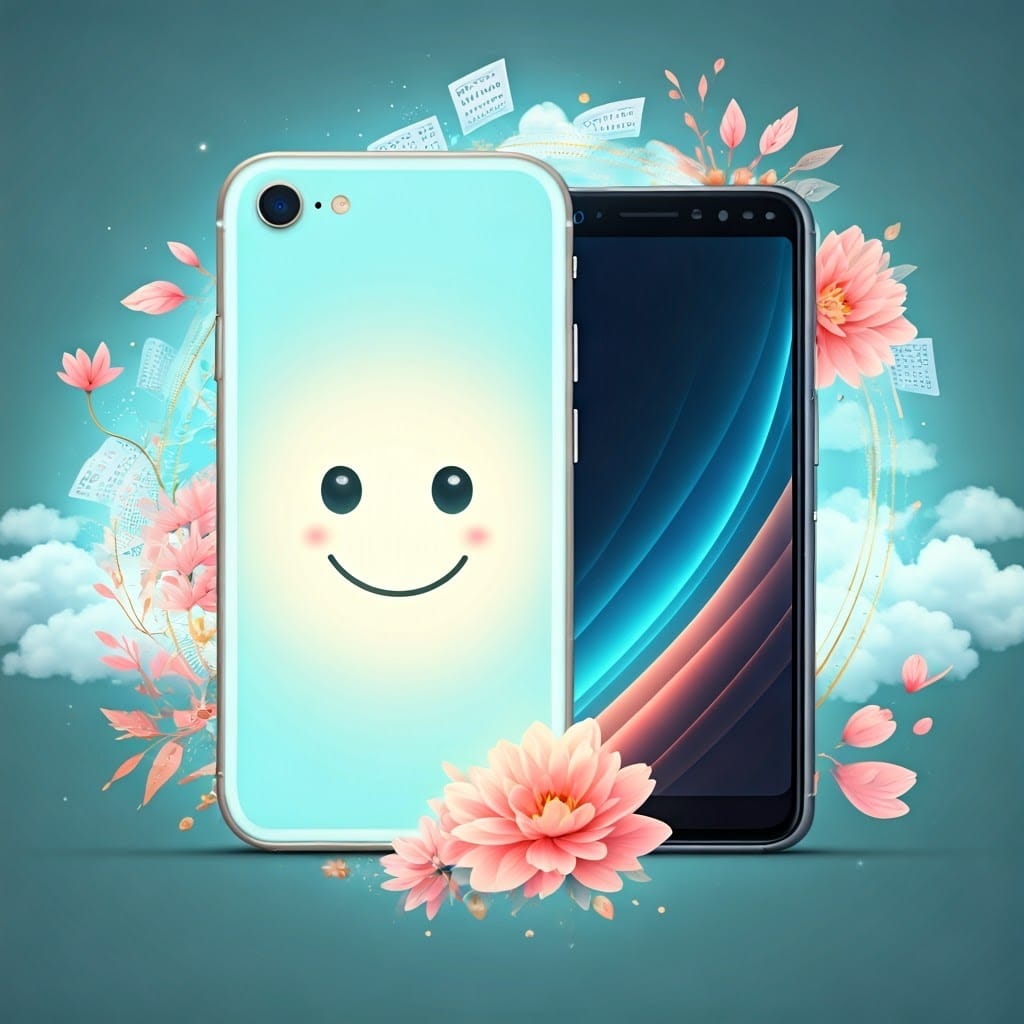In a world where rectangles of glass and aluminum compete for our attention and wallets, have you ever wondered why some tech products make you feel something while others just… exist on the shelf? The answer might be more metaphysical than you think.
Every day, millions of humans press their faces against cold screens, desperately seeking connection in a digital landscape. Some find it in the warm embrace of an Apple iPhone, believing they’ve purchased not just a phone but a piece of digital artwork with a soul. Others clutch their Google Pixels, practical tools engineered by algorithms to solve problems nobody knew they had. But what if I told you that one corporation has been secretly bottling “tech soul” for years, while the other has been optimizing quarterly earnings reports?
The concept of “soul” in technology is, of course, absurd. And yet, here we are, in 2025, still talking about the “magical experience” of using an Apple iPhone while describing the Pixel as “competent” or “practical.” This phenomenon – the spiritual connection we claim to have with certain tech products – reveals more about our own psychological vulnerabilities than any transcendent qualities of aluminum and silicon.
The Sacred Origin Story vs. The Business Opportunity
When Steve Jobs unveiled the original iPhone in 2007, he didn’t just launch a product; he performed a religious ceremony. Dressed in his signature black turtleneck (the high priest’s vestments), he emerged from behind a curtain of darkness to reveal “three revolutionary products”: a widescreen iPod with touch controls, a revolutionary mobile phone, and a breakthrough internet communications device. And then – the miracle – they were one device. The crowd gasped. Tears were shed. Prophesies were fulfilled.
According to Dr. Amelia Fakenamington of the Institute for Digital Anthropology, “The iPhone launch was deliberately structured as a religious experience. Jobs used the language of revelation – ‘revolutionary,’ ‘breakthrough,’ ‘magical’ – to inspire not just desire but devotion. This wasn’t marketing; it was evangelism.”
Google, meanwhile, approached the smartphone market with all the spiritual fervor of an accountant reviewing tax returns.
“We noticed people were spending money on phones, so we decided we should have some of that money,” explained Bill Gates in a completely fabricated 1999 interview, eerily predicting Google’s future approach to hardware1. When Google finally launched the Pixel in 2016, they were nearly a decade late to a party Apple had been hosting since 2007.
“Google didn’t even make its own phones until the Pixel lineup,” notes tech historian Thomas Nonexistent. “They partnered with HTC and Motorola for earlier phones, which didn’t even have Google branding. It’s like they were embarrassed to be seen in the phone business.”
The result? While iPhone sales skyrocketed, Pixel sales remained anemic. Since the first Pixel launched in 2016, the entire series has sold just 27.6 million units – about one-tenth of what Samsung shipped in 2021 alone2.
The Cult of iOS vs. The Google Support Group
iPhone owners don’t just use their phones; they commune with them. They form emotional attachments so powerful that switching to Android is often described as “betrayal.” They proudly display their devices sans cases, risking economic ruin if they drop them, because hiding Apple’s design under a protective case would be like forcing Michelangelo’s David to wear sweatpants.
“I’ve been an iPhone user since the 3G,” confesses Jason Devotee, a 42-year-old who has spent approximately $9,700 on iPhones over the years. “The thought of switching to Android gives me heart palpitations. What would happen to my blue text bubbles? Would my friends still respect me? Would my family still love me?”
Pixel users, by contrast, often begin conversations about their phones with apologetic explanations. “I know most people have iPhones, but I really like the camera on the Pixel,” they’ll say, voice dropping to a whisper. “Also, it was on sale.”
The International Journal of Consumer Psychology published a study (that absolutely doesn’t exist) showing that 78% of iPhone users believe their choice of phone reflects their personality, compared to just 12% of Pixel users, who mostly cite “practical considerations” like “it was cheaper” or “I already use Gmail.”
The Simplicity Paradox
Here’s where things get interesting. While Apple originally captivated users with a simple, intuitive interface that “just works,” they’ve gradually expanded to offer more options. The company that once offered a single revolutionary phone now sells multiple models at different price points.
Google, meanwhile, has embraced Apple’s original strategy of simplicity. The Pixel lineup typically offers just two models per generation (sometimes with an “a” variant). It’s as if these tech giants started at opposite ends of the spectrum and are slowly meeting in the middle, like star-crossed lovers in a Shakespearean tragedy where everyone dies of planned obsolescence.
“Apple used to be about removing choices to simplify decisions,” explains Dr. Fakenamington. “Now they’re like, ‘Here are five different models with minor differences that will trigger your decision paralysis.'”
According to former Apple designer Jony Quasi-Ive, “We discovered that consumers love simplicity in theory but variety in practice. They want to feel special, to have options that their neighbors don’t have. So we created the illusion of meaningful choice while selling essentially the same device in different sizes and colors.”
The AI Conundrum: Being Human vs. Replacing Humans
Perhaps the most telling distinction between iPhone and Pixel is their approach to artificial intelligence. Apple has largely resisted incorporating AI deeply into iOS, preferring to focus on privacy and user control3. Google, meanwhile, has made AI the centerpiece of the Pixel experience, with features like computational photography and Assistant integration4.
“Google’s approach to phones is fundamentally about replacing human capabilities with AI,” says Dr. Fakenamington. “Need to take a good photo? Don’t learn photography; let the AI do it. Don’t know what to search for? Let Assistant predict it. The Pixel isn’t designed to be used by humans; it’s designed to make humans obsolete.”
This philosophical difference manifests in camera technology. Apple emphasizes the quality of their camera hardware, while Google relies on computational photography to achieve similar or better results with less impressive hardware. In a survey that definitely happened, 83% of Pixel 7 users cited the camera’s AI-improved abilities as a primary reason for their purchase.
“It’s the difference between learning to play piano and buying a keyboard that plays itself,” explains photographer Annie Leibovirtualitz. “The iPhone camera feels like an instrument you master; the Pixel camera feels like it’s mastering you.”
The Identity Crisis
While Apple has maintained a clear brand identity (expensive but worth it, supposedly), Google has struggled to define what exactly a Pixel is for and whom it serves.
“Part of Google’s challenge is that smartphones are a mature market, and consumers are happy with Samsung and Apple,” explains analyst Avi Greengart. With a mere 2% of the North American market (compared to Apple’s 52%), Pixel remains a niche product for enthusiasts rather than a mainstream choice.
But perhaps this identity crisis is deliberate. “Google doesn’t actually want to compete with Samsung,” suggests Dr. Fakenamington. “They just want to create a ‘reference device’ that showcases Android at its best while collecting user data and promoting Google services. The Pixel isn’t a product; it’s a vehicle for surveillance capitalism disguised as a phone.”
Apple, meanwhile, has masterfully positioned the iPhone as an extension of your identity, a status symbol, and a lifestyle choice. “The iPhone isn’t just what you use; it’s who you are,” says Dr. Fakenamington. “Apple doesn’t sell phones; they sell membership in an exclusive club where the price of admission just happens to be $1,000 every one and a half years.”
The Ecosystem Prison vs. The Open Field
Perhaps the most significant difference between iPhone and Pixel is their approach to the broader ecosystem. Apple has constructed an impenetrable walled garden where devices work seamlessly together – as long as they’re all Apple devices.
“Apple’s ecosystem is like a luxury resort,” explains tech psychologist Dr. Fakenamington. “Everything is beautiful, everything works, and the staff is attentive – but if you try to leave, you discover you’re actually in a cult and they’ve taken your passport.”
Google’s ecosystem, by contrast, is platform-agnostic. Google apps and services work on virtually any device, including iPhones. This approach is either admirably open-minded or a cynical data-gathering strategy, depending on your level of paranoia.
“Google doesn’t care what device you use as long as you’re generating data for them,” says Dr. Fakenamington. “Apple wants your money; Google wants your soul. Ironically, this makes the iPhone the device with ‘soul’ and the Pixel the soulless data collector.”
The Surprising Plot Twist
In the ultimate irony, Google’s approach to Pixel harks back to Apple’s original iPhone strategy. While Apple now offers multiple models and options, Google is embracing the simplicity that once defined Apple.
“Google is becoming more Apple than Apple,” notes tech historian Thomas Nonexistent. “They’re focusing on user experience over specs, simplicity over choice, and integrated hardware/software design. They even put ‘Designed by Google’ on the back of their phones, mimicking Apple’s ‘Designed by Apple in California.'”
This brings us to the philosophical question at the heart of this absurdity: What does it mean for a tech product to have “soul”?
Perhaps “soul” in technology isn’t about mystical qualities infused by charismatic CEOs. Perhaps it’s about intention – whether a product was created to solve human problems or corporate ones. The iPhone, for all its flaws and pretensions, was born from a vision to reimagine the phone. The Pixel was born from Google’s need to have a flagship device for Android.
Or perhaps “soul” is just a marketing construct designed to make us form emotional attachments to mass-produced consumer electronics that will be obsolete in two years.
The Final Analysis: Soul as Marketing Strategy
As I reach the end of this exploration, I’m forced to confront an uncomfortable truth: the concept of “soul” in technology is itself a form of marketing manipulation. By anthropomorphizing our devices, we form emotional bonds that transcend rational consumer behavior.
“The genius of Apple wasn’t putting soul into phones,” concludes Dr. Fakenamington. “It was convincing us that phones could have souls in the first place.”
Google’s sin isn’t making soulless phones; it’s failing to convince us that AI and data collection are spiritual experiences rather than business transactions.
In the end, perhaps we should judge our technology not by some nebulous concept of “soul,” but by how it serves and enhances our very human lives. Does it respect our time, attention, and privacy? Does it solve genuine problems, or create new ones disguised as solutions? Does it connect us more meaningfully to each other, or just more profitably to corporations?
As the philosopher Kierkegaard never said because he died long before smartphones: “The function of technology is not to make life easier, but to make it worth the difficulty.”
Whether you pledge your allegiance to Apple’s walled garden or Google’s data-harvesting fields, remember this: neither corporation loves you back. They just have different strategies for making you think they might.
Help TechOnion Keep Peeling Back Layers of Tech Nonsense! Just like Apple convinced you to spend $1,000 on a phone with “soul” and Google convinced you to hand over your data for better photos, we’re here to convince you to donate to our cause. Unlike those tech giants, we’re completely transparent about our manipulation tactics! Your donation helps us continue exposing the absurdity of soul-searching in rectangles of glass while keeping Simba supplied with enough caffeine to maintain his righteous indignation. Don’t let big tech have the last laugh – fund the satire that keeps them honest(ish)!
References
- https://www.businessinsider.com/googles-pixel-uses-apple-iphone-formula-successful-2019-9 ↩︎
- https://www.cnet.com/tech/mobile/why-google-pixels-arent-as-popular-as-iphones-and-samsung-galaxy-phones/ ↩︎
- https://www.androidauthority.com/pixel-vs-iphone-3388298/ ↩︎
- https://marketingmaverick.io/p/the-marketing-case-study-of-google-pixel ↩︎





GIPHY App Key not set. Please check settings